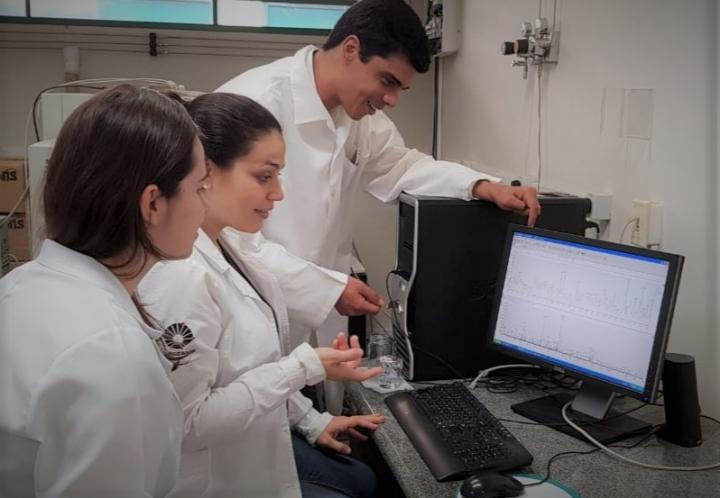The blood test method makes use of machine learning and can be used to predict whether patients will put on weight, unless they change their habits. The project was conducted in Brazil with funding from FAPESP.

Credit: Unicamp
Researchers at the University of Campinas (UNICAMP) in São Paulo State, Brazil, have developed a computer program that analyzes molecules in blood plasma to search for biomarkers that identify individuals who are at risk of becoming overweight and developing obesity-related diseases.
The project was supported by FAPESP. The principal investigator was Professor Rodrigo Ramos Catharino, head of UNICAMP’s Innovare Biomarker Laboratory. The results are described in the journal Frontiers in Bioengineering and Biotechnology.
“The test is 90% accurate in detecting whether the subject will gain weight without any kind of intervention,” Catharino told Agência FAPESP. “It also shows whether there’s a risk of developing diseases such as diabetes, high blood pressure and dyslipidemia [abnormally elevated levels of fat in the blood]. It’s an important tool because health professionals can use it to recommend lifestyle changes before a problem materializes.”
The test consists of a mass spectrometer analysis to detect all the metabolites present in the patient’s blood and produce a profile of the various metabolic processes at work in the organism. The data obtained by mass spectrometry are processed by the new software.
The program was written as part of Flávia Luísa Dias-Audibert’s PhD research, in partnership with researcher Luiz Cláudio Navarro. Dias-Audibert’s thesis advisor is Professor Anderson Rezende Rocha of UNICAMP’s Computer Science Institute.
The group was supported by the Obesity and Comorbidities Research Center (OCRC), a Research, Innovation and Dissemination Center (RIDC) funded by FAPESP and hosted by UNICAMP.
“The program screens the blood sample for five metabolites that function as biomarkers with the potential to predict weight gain,” Catharino said. “When one of these biomarkers is present in the sample, the patient will tend to develop diabetes if he or she becomes obese.”
The software files are open-source and can be downloaded free of charge from the internet. According to Catharino, any health service with access to a mass spectrometer can apply the methodology.
“It’s an inexpensive technique and affordable even for the SUS [Brazil’s national health system]. All you need is one mass spectrometer for a network of hospitals and outpatient clinics,” Catharino said.
Machine learning
The methodology developed at UNICAMP combines metabolomics (the analysis of all the metabolites in a biological sample) with machine learning, a subdiscipline of artificial intelligence. The researchers used data obtained from the analysis of blood samples supplied by 180 people to “teach” the program to recognize a pattern associated with weight gain.
Half the volunteers included in the study were within the body mass index (BMI) range deemed healthy, while the rest were overweight to varying degrees or obese.
“Anthropometric measurements [weight, height and body mass] were taken for all participants, who also completed a questionnaire on family history of chronic disease, as well as age and gender,” Catharino said. “We used some of the patients to train the software and the others to validate it by comparing its results with their own anthropometrics and health history. The random forest machine learning algorithm was used for the training part.”
The researchers found that 18 metabolites can serve as biomarkers of metabolic processes relating to fat accumulation, five of which have the potential to predict weight gain.
“Prostaglandin B2 and carboxy-leukotriene B4 are metabolites of arachidonic acid [a fatty acid in the omega-6 family] known to participate in inflammatory processes, in the recruiting of cells to the site of inflammation, and in the production of reactive oxygen species [an excess of which impairs cell functioning],” Dias-Audibert said. “Two other molecules we identified were argininosuccinate and dihydrobiopterin, both of which are involved in the nitric oxide cycle and can be considered markers of free radical production.”
According to Dias-Audibert, the combination of these biomarkers suggests that feedback from the inflammatory cascade occurs in overweight individuals. “This finding matches those of several studies that describe low-grade chronic inflammation as one of the active deleterious processes in the overweight condition,” she said.
The fifth biomarker found to be a potential predictor of weight gain was carboxy-methyl-propyl-furanpropanoic acid (CMPF), a metabolite associated with dysfunction of the insulin-producing cells in the pancreas and the development of diabetes. “Considering there were diabetics in the study group, this biomarker could be the link between weight gain and diabetes,” Dias-Audibert said.
Catharino said the computer program can also be used by health professionals to assess the effectiveness of a treatment prescribed to reduce a patient’s percentage of body fat.
“Even before the subject loses weight, it’s possible to know whether the intervention is working well. If the metabolic processes that lead to fat accumulation are interrupted, the 18 metabolites we identified will tend to disappear from blood plasma,” he said.
The article “Combining machine learning and metabolomics to identify weight gain biomarkers” by Flávia Luísa Dias-Audibert, Luiz Claudio Navarro, Diogo Noin de Oliveira, Jeany Delafiori, Carlos Fernando Odir Rodrigues Melo, Tatiane Melina Guerreiro, Flávia Troncon Rosa, Diego Lima Petenuci, Maria Angelica Ehara Watanabe, Licio Augusto Velloso, Anderson Rezende Rocha and Rodrigo Ramos Catharino can be read at: www.frontiersin.org/articles/10.3389/fbioe.2020.00006/full.
Media Contact
João Carlos Silva
[email protected]
55-113-838-4351
Original Source
http://agencia.
Related Journal Article
http://dx.




